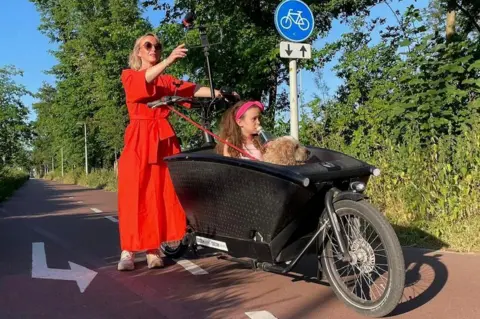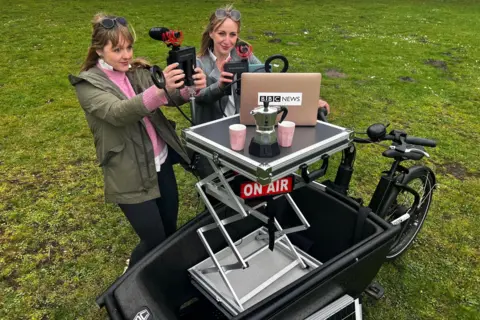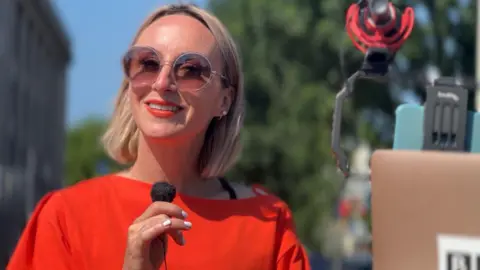 BBC
BBCI planned the ordinary afternoon – packing bags, ready to roll – when I limited it down and hit the disbelief.
The space where my freight bike should have been empty, and the double lock that attached it to my Amsterdam apartment wall.
My daughter shifted between other bikes, convinced that someone had to move him, but no, there was no.
With a bicycle deeply built into everyday life here in the Netherlands – part of “Dutch DNA”, as we say – I don’t have a car, so I used my bike for everything, from school at school until shopping.
This was not an ordinary bicycle. My colleague Kate Vandy and I caught us to become a broadcasting studio, which we called the bicycle bureau. I started “Dutch news from the track cycle”, a series of reporting born at school after my daughter asked me, “Why don’t you just tell people now?”
My bike allowed me to reach scenes news and broadcast live from anywhere, my daughter, showing that working motherhood could be visible, joyous and real.

The door was opened in cooperation, rewards and community of people who have seen themselves in our story.
I have a zero expectation to return my bike and looked for it fruitless. I called the police immediately and opened the case, but it closed it soon after the lack of evidence to help find the thief.
People online and in my local community have gathered to try to find it because I made an appeal. The neighbors asked if I was okay, I tell me that they liked to see me enjoying their bike lanes and see their city from the perspective of my stranger.
But why, my daughter asked, made so many people to worry about our bike was stolen?
Life-hack and much more
Colleagues and friends answered my Instagram Roll about theft. The legendary BBC Cameravoman Julie Ritson called my bike draft for the future of journalism. Others said it was a relative life that showed that one person can manage motherhood and career and inspired them to re-examine what is possible with freight cycling.
It was a solar power supply, reducing the need for satellite trucks with heavy equipment and pollution that brings the mode.
Exploration last year from Roiters Institute to study journalism is not only interested in climate change newspapers that emphasize the actions that empowered the actions that empowered the actions in response to the crisis.

Some people expressed a surprise that “this kind of thing” would happen in the Netherlands. What can’t realize is that the stealing of the endemic bike here. Last year, more than 86,000 bicycles were registered in the Netherlands, compared to 1,000 compared to the year earlier, and 10,000 more than 2022. years, according to police figures. Authorities say the increase in report may have contributed to that.
Most stolen bikes took place for parts or sold. My e-cargo bike costs almost 5,000 euros (4,200 lbs) – more than our old car I sold.
I paid for the bike, so the BBC is not to be any financial loss.
What really bought me was independence – and in a way loss is like a friend loss. In addition to the influence of my own life style, that bike gave my daughter magical, childhood in nature: the gears, to see fuel on tall cows, fairy tales, brightly rides on the beach in the summer.
Theft caused talks on urban security, cycling infrastructure, and mothers in the load continues to wear. But it is also a vest of communities we have built and the power of authentic saddles stories.
I may not return the bike, but no one can steal what it gave us everything.






